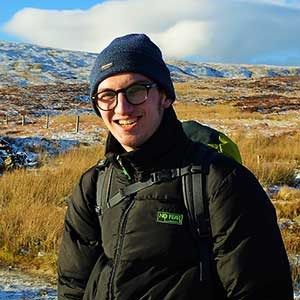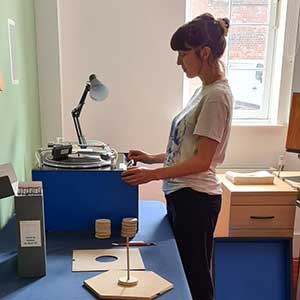On this page
Developing the organisation
Working through the pandemic
Literally everything we did this financial year was in some way impacted by the global pandemic, and we are pleased to say we were able to continue engaging with our audiences, albeit digitally, the whole time.
We have weaved mention of restrictions, new ways of working, and new or tailored services throughout this Annual Review, but we could not have done it all without solid infrastructural support. We spoke to colleagues in IT and estates (building management) about how they did it.
IT: Helping everyone to work from home, and quickly
By March 2020, part of the preparation for mobile working was already in place. Our IT department had already begun a switch to mobile desktops back in 2019, so by March 2020 a small percentage of staff were already equipped.
With VPN technology already in place, we were ready for remote access. When lockdown happened, we had a small stock of laptops that we then very quickly built, configured and deployed to key staff.
Other urgent work included scaling up our software licences for all the new staff members who now required VPN access. By the end of the summer, most staff members had Library-supplied hardware for remote working.
Another piece of work that stood us in good stead was buying Office 365 a few years previously. This collaborative platform integrated well with our new intranet. The key target was to quickly make as much data accessible via the Cloud as possible.
The Microsoft Office 365 platform included Teams, which was fast-tracked for upgrading and roll-out. The rapid uptake of Teams enabled staff to communicate and collaborate online with a minimum of disruption. We adjusted rapidly to home working thanks to the support everyone received from the IT department, which often involved providing tuition on new and unfamiliar systems. Our IT team met regularly with heritage sector partners during the pandemic. This was a great way of sharing knowledge, expertise, challenges and solutions. This valuable collaboration has continued, with ongoing workshops and sharing best practice. Considering what might happen with working patterns in the future, we are considering how a hybrid model of working may continue.
We are continuing to shift our hardware strategically to a mobile foundation while keeping fixed infrastructure in buildings where needed.
Looking after our buildings and staff
From March 2020, we developed several approaches to coping during lockdown and reopening the Library. These are as follows:
Protection of the collections
Key to maintaining the collections, especially with reduced staff, was focusing on maintaining environmental conditions to prevent the collections from degrading. This included checking air quality and working to ensure that temperature and humidity levels were kept within specified boundaries in our stacks and collection areas.
Reopening to staff
Before reopening the buildings to staff, estates colleagues worked with senior managers to carry out risk assessments throughout all of our buildings. These were followed by floor plans marked with desired routes, minimum distancing and sanitation stations. They then had (safe) walkarounds with other staff members so they could take their feedback to manage any concerns or anxieties as early as possible.
Reopening to the public
We had to consider the maximum safe level of readers at any one time and the routes they would follow to enter the Library, enter and exit the reading rooms, and safe and distanced seating arrangements.
We managed all of this despite many people working from home, as well as Covid-related supply chain issues.
The estates team is a critical part of our gradual reopening, which will continue well into the autumn.
2020 Annual Appeal for Scotland's new writing
It was encouraging to know that donors to our 2020 Appeal shared our enthusiasm for new writing and its ability to enrich our lives, particularly in this challenging year.
On our shelves, new works which capture the vibrancy of our contemporary world sit alongside the works of historical and established writers. This year's appeal enabled us to support and spotlight new writing, as well as collect it.
In the spring we hosted a series of workshops in which members of the Scottish BAME (Black, Asian and minority ethnic) Writers Network were introduced to the Library's archives, as inspiration for their work. There was a general desire among the group to find and tell the stories of people who are under-represented in the collections. The resultant pieces will be brought together into a zine.
We also partnered with Glasgow Women's Library to host creative writing webinars using exhibits from the 'Petticoats and Pinnacles' exhibition as creative prompts.
Funds from the appeal will also be allocated to our forthcoming major exhibition (scheduled for 2022) focusing on literature, the publishing industry and an author's brand — specifically the reasons that authors historically have chosen pseudonyms.
We'd like to thank everyone who contributed to this appeal.
The 2020 internship scheme
We host paid internships every year to help young people or those early in their careers to gain crucial work experience in the culture and heritage sector. This year, we increased these numbers in a bid to assist as many people as possible given the chances of getting any work experience during the pandemic were slim.
All interns completed exemplary work for the Library during their time with us — even though some have never set foot inside our buildings. We learned as much from them as they have from us. Meet the latest cohort below.
Carissa Chew, Equalities, Diversity and Inclusion Intern

Equalities, Diversity and Inclusion Intern.
Carissa reviewed the ways we describe and interpret offensive material (including historically), and explored how we should warn people about the harmful content they may encounter. She also helped us to begin to apply modern standards of description for protected characteristics and other areas of cultural sensitivity.
Carissa said: 'One project I found very valuable working on was creating a glossary of (offensive) terminology — the domains of race, gender, age, disability, class.
'This required a lot of research into histories of certain terminologies and I learnt a lot that I didn't know before. Using this, I started to trace the evolving use of this language in the catalogues and collections.'
Carissa placed us in great stead to carry on this work after she left — work that will have to continue alongside the evolution of language. She is about to embark on a PhD in History at the University of Hawaii, researching the history of people of mixed Black/South Asian heritage in 20th-century Tanzania, Kenya, and Uganda.
Carmen Hesketh, Access and Outreach Intern
Carmen's internship focused on exploring how we can improve our services to become more inclusive and welcoming to a wider range of audiences.
The 'access' component examined the changes we could make to ensure that everyone — regardless of background — feels able to engage with us (be that on-site or online).
The 'outreach' element looked at how we might promote the collections to the public in a way that is tailored for them — covering a range of areas including partnership working, digital engagement, representation and specialist events.
Carmen said: 'I have worked with a research company doing focus groups with under-represented groups. These are people that don't use the Library and we wanted to learn the reason for that, with a view to giving the groups more of a reason to engage.
'This is quite an exciting time to be working in this field, where there is more of a focus on making heritage accessible for everyone.'
Carmen is moving on to a Masters in Collections and Curating Practices at Edinburgh College of Art. As we have a partnership in place with that programme, it might not be long before we see Carmen again.
Jennifer Stewart, Data: Rights and Personalisation Intern
Jennifer's role involved two areas. First, she researched how we can make steps towards offering a personalised Library experience to residents across Scotland. Second, her focus was to identify ways to make it easier to assign and understand the rights statements attached to our collections items, which are published freely online.
Jennifer said: 'One of the most interesting parts of my internship was that I'd been co-opted onto a project focused on the Library's eResources service. This involved going through an intensive and pioneering 'agile training' programme, which was such a good opportunity to learn new skills and be involved in an innovative project working with staff from across the Library.'
Jennifer also applied, on behalf of the Library, to SLIC (Scottish Library and Information Council) for funding for a personalisation project. As Jennifer said: 'Again, not something I had expected to be entrusted to an intern!'
Jennifer will continue at the Library until December this year.
Joanne MacLennan, Gaelic Translation Intern
Joanne's main job was to translate the Library Search interface (or online catalogue) into Gaelic. This means that 60,000 Gaelic speakers, including native speakers, will soon be able to search using Gaelic terms.
Joanne said: 'It all sounds very simple — a nice, straight translation, until you consider things like the fact that there is no straight translation of 'yes' in Gaelic — so a quick yes/no pop-up box becomes a bit of an issue!
'Similarly, there is no Gaelic equivalent of the Boolean operators and/or/not. I benefitted, however, from the support of a Gaelic mentor and freelance translator, and from good contacts at BBC ALBA.'
The job became bigger than originally envisaged. Joanne found herself involved with translation across the Library, including for social media, contributing to the web archiving of Gaelic websites relating to the Scottish Parliamentary election, and helping librarians with requests that arrived in Gaelic.
Joanne will continue at the Library until mid-September.
Caitlin McDonald, Creating Media Content Intern
Caitlin was recruited to research the development of an online media centre which journalists and producers could easily access to reuse our content across a wide variety of outputs. She also researched and reached out to up-and-coming art critics, journalists and writers to help bring our content to new audiences, as well as creators who could collaborate with the Library on future projects which better reflect the make-up of 21st century Scotland.
Caitlin became an instrumental part of the media team while working at the Library, pitching stories to media and writing blogs, media releases and social media content.
Caitlin said: 'One of the most interesting things I've done is work with my fellow interns to create a series of blog posts. I've also been collaborating with staff members to produce reading lists for a series of subjects, for example, Women's History Month. I have also helped host climate-related events at the Library, which felt so pertinent with the upcoming COP26 conference.'
Caitlin is now doing a communications internship with the UN, specialising in climate change communications.
Henry Roberts, Climate Crisis Intern

Henry's role is to help us deliver our upcoming Climate Action Plan, laying out a sustainability vision for the organisation to implement over the next four years. This involves both looking at how we run our building and operations (for example, carbon management, waste disposal, procurement policies, and so on) as well as looking at how we can use the collections to educate people on the climate crisis.
Henry said: 'There is a stereotype of the intern being the one who makes the coffee and does the photocopying, but my experience at the Library couldn't be further from this. Since starting, I have had a genuine role of responsibility, which has been a real treat.
'When I started, the goal of producing a Climate Action Plan for the organisation was just a concept, but with some concerted effort, support and belief in me, it is now an ambitious document which has gone to the leadership team for sign off.'
Henry continues to work part-time at the Library to deliver the Climate Action Plan.
Alexander Graham trainees
Sophie Tupholme, Moving Image Archive Technician
Sophie's role was to develop the skills, knowledge and understanding of the care, preservation and digitisation, and use of archival moving image materials, including film and videotape. It included many tasks such as digitising analogue and digital video formats, restoring works, creating condition reports and adding catalogue information.
At the archive, Sophie has been digitising various collections including Scottish Ballet, the Strathclyde Partnership for Transport Executive, Singing Kettle and Grampian Television from various analogue and digital videotape formats. In doing so, she's been learning about the idiosyncrasies of these often-obsolete materials and playback machines, and has been practising handling, care, and repair of these fragile formats. She's also been undertaking a digital restoration of the first film shot in Scotland, 'Queen Victoria at Balmoral Castle'.
Sophie said: 'This internship is allowing me to cross a bridge from the theoretical into the practical, hands-on elements of moving image preservation.
'The opportunity to spend nine months at an archive is also exceptional — in my experience, internships in this space are usually three to four months at a time.'
Susannah Stark, Archival Sound Technician

Susannah has been digitising the Dean Myatt Collection of 78rpm shellac discs, giving her a greater understanding of the history of sound recording and record pressing, as well as technical information about shellac, vinyl and test discs made with cellulose nitrate.
Susannah says the traineeship has provided her with an insight into the daily workings of a library, from the perspective of developing a sound collection. She now has experience of handling fragile formats, digitisation, editing sound files, cataloguing, and developing an interpretation of the collection.
Susannah said: 'This time has been important to me in ways that I don't even know yet — in terms of my personal interests and future employment.
'I'm glad to have had such a positive experience of work, meet new people and contribute to the process of making audio material available to people in the future.'
Yolanda Bustamante Sampedro, Fragile Formats Conservation Intern
Yolanda's placement has been focused on the conservation of our most frail collections items, consisting of a variety of paper materials.
Before (the second) lockdown, Yolanda carried out practical conservation work across the two main collections buildings in Edinburgh — George IV Bridge and Causewayside. This included treating bound and unbound materials, learning new binding techniques, and taking part in a 'conservation for digitisation' project.
Once the second lockdown occurred at the end of 2020, there had to be a change of focus. This involved attending webinars, studying, researching, and helping colleagues working on internal policies — but mostly developing a decision-making matrix for the treatment of iron gall ink.
Yolanda said: 'If we learnt something from 2020, it is to expect the unexpected and the importance of resilience.
'So lockdown was turned from a forced impasse to just an unexpected diversion. Now that we are back in the buildings, I plan to make the most of the rest of my internship, apply the tools that adapting from necessity has given me and make up for the time away from my bench.'
With thanks to Alexander Graham for funding these traineeships.
Funding our work
Income and spending 2020/2021
Income 2020/21
Donations and legacies: £418,000
Charitable activities: £450,000
Other trading activities: £24,000
Investments: £169,000
Other - Grant-in-aid: £16,880,0000
Total: £17, 941,000
Spending 2020/21
Staff costs: £12,143,000
Depreciation: £3,251,000
Building maintenance: £1,075,000
Oher property costs: £712,000
Collection purchases, etc.: £632,000
Other running costs, etc.: £1,760,000
Total: £19,573,000
